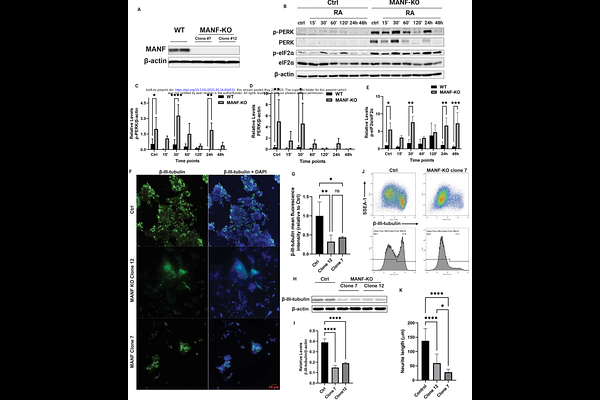Alcohol Disrupts Neural Differentiation Through Endoplasmic Reticulum Stress and PERK Pathway Activation

Alcohol Disrupts Neural Differentiation Through Endoplasmic Reticulum Stress and PERK Pathway Activation
Zhang, Z.; Wen, W.; Lin, H.; Hu, D.; Li, H.; Luo, J.
AbstractPrenatal alcohol exposure (PAE) can lead to fetal alcohol spectrum disorder (FASD), a condition marked by developmental brain defects that result in neurobehavioral and cognitive impairments. However, the underlying molecular mechanisms remain poorly understood. Brain development is a highly regulated process, with neurogenesis playing a crucial role. A key stage in this process is neural differentiation, which is essential for proper brain function. This study aims to investigate how alcohol disrupts neural differentiation. NE-4C cells, a neural stem cell line derived from the mouse embryonic brain, were utilized as an in vitro model. As an in vivo model, pregnant mice were exposed to alcohol between gestation days 14 and 16, after which newly formed neurons in the ventricular zone (VZ) were analyzed. To examine the role of endoplasmic reticulum (ER) stress, tunicamycin (TM), and MANF-deficient NE-4C cells were employed. Neural differentiation was assessed using immunofluorescence, immunoblotting and flow cytometry. Alcohol impaired the differentiation of NE-4C cells into neurons and astrocytes without impacting cell migration. It also induced ER stress, preferably activating the PERK pathway. Similarly, ER stress caused by TM and MANF deficiency disrupted neural differentiation and activated PERK. Inhibiting PERK mitigated alcohol-induced impairment of neuronal differentiation. PAE decreased the number of newly formed neurons in the VZ of fetal brain while having little effects on cell survival and proliferation. Inhibiting PERK partially reversed the reduction of new neurons caused by PAE. Thus, alcohol-induced ER stress, particularly PERK activation, may contribute to impaired neurogenesis linked to FASD.